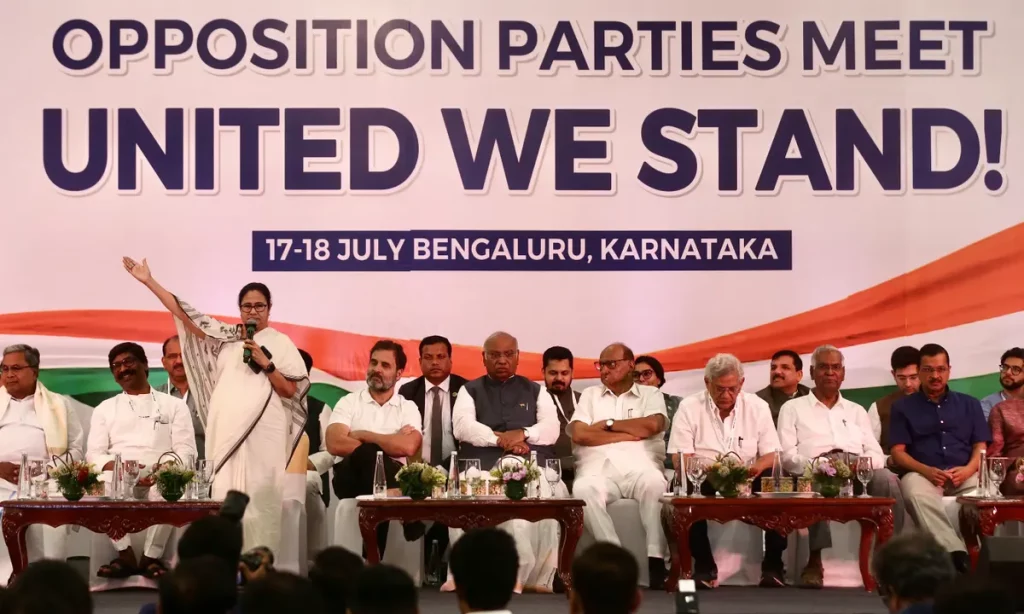With the recent assembly elections in Madhya Pradesh, Rajasthan, and Chhattisgarh, the Bharatiya Janata Party (BJP) emerged victorious overall. Despite this, some Congress supporters showed unexpected confidence, highlighting the need to maintain vote shares in these states as a possible strategy for taking on the Narendra Modi-led BJP in the next Lok Sabha elections. This optimism, however, ignores the complexity of Indian politics today, which poses a significant socio-political problem that cannot be solved only by electoral means. There must be a deeper struggle for civilization’s soul, which necessitates a more sophisticated strategy than simple electoral math.
Socio-Political Challenges
Whether opposition groups have the political and intellectual clout to overcome national divisions and stop the spread of Hindutva votes at the grassroots level is a crucial dilemma facing them. While winning elections is a problem, tackling the socio-political forces that encourage polarisation and communalism is a greater concern.
Compensatory Muslim Votes
Upon closer inspection, the assembly elections exhibit some fascinating dynamics. Scheduled Caste and Other Backward Classes (OBCs) account for approximately 65% of the population in Madhya Pradesh. The BJP increased its vote share among OBCs and Scheduled Tribes (STs) and retained its vote share among SCs, while the Congress saw a 4% and 6% decline in votes from these communities. Notably, Muslim votes for the Congress increased significantly, offsetting losses in other social bases.
In Chhattisgarh, the Congress retained a substantial vote share of 42.23% in spite of losing. Nonetheless, a noteworthy 12% rise in Muslim votes more than offset the drop in the vote share of STs and OBCs. On the other hand, the BJP gained a lot of ground with Muslims and emerged as a strong candidate for their support.
The Congress maintained its overall majority in Rajasthan because 28% more Muslims cast ballots than the previous year. But among STs and OBCs, this compensating gain decreases. Taking advantage of its Hindu social base, the BJP increased its share of the vote by undermining the Congress’s historical support from SCs, STs, and OBCs.
Electoral Polarisation and the Hindutva Campaign
The Rashtriya Swayamsevak Sangh (RSS) ran an unrelenting Hindutva campaign all year long, which contributed to the BJP’s rise in these states. With no real political opposition, this campaign is expected to get more intense in the run-up to the Lok Sabha elections, which would further divide Hindu OBCs and other communities. The difficulties they encounter in refuting this narrative are exacerbated by the Congress’s and the India bloc’s lack of organisational and intellectual alternatives.
Lessons for the Opposition
Even though the electoral math appears to be in Congress’s favour, focusing only on numbers misses the political and ideological struggles that are taking lace. The opposition faces a serious threat in the 2024 elections due to a polarised environment, which is demonstrated by the BJP’s increased proportion of votes from Hindus. The India bloc finds it difficult to articulate a coherent and alternative vision, while the BJP’s emphasis on matters like national security, Ram Mandir, and the idea of Hindu Rashtra strikes a powerful chord.
Looking beyond 2024
The opposition might learn a vital lesson from the electoral data from the latest assembly elections. It is self-deception to merely rely on susceptible vote shares and hope for a miracle in 2024. There’s a chance that in a Lok Sabha election dominated by hyper-religious nationalism, votes from the Congress, especially those motivated by secular concerns, could go to the BJP.
There is more to the fight in 2024 than just math. It calls for a vision of social-economic justice, substantive equality, and brotherhood, as well as a principled stance on secularism. Securing the notion of India is unlikely to be achieved by diluting the secular agenda or adopting the political strategy of the BJP. Beyond electoral struggles, serious politics need preparation and inventiveness, along with an unwavering dedication to a vision that goes beyond watered-down Hindutva. The problem is a call for a deeper socio-political revolution rather than just an electoral one.
